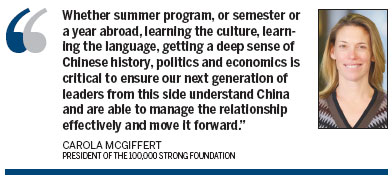Aiming for 100,000
Updated: 2013-11-08 13:46
By Chen Weihua (China Daily USA)
|
||||||||
More American students are going to China to study under the 100,000 Strong Initiative and finding it to be a life-changing experience, Chen Weihua reports from Washington.
It was 4 pm and Chinese tea time at the Sigur Center for Asian Studies at George Washington University on a recent Thursday. Caitlin Keliher, a senior, was taking part in a group chat in Chinese led by the center's director Edward McCord, a professor of Chinese history.
The topics were mostly China related, ranging from studying there and learning Mandarin to Chinese warlords in the 1920s, a subject that is McCord's specialty.
|
Caitlin Keliher, now a senior at George Washington University in Washington, ascends the Great Wall at Badaling in Beijing last summer. Keliher spent six months at the Minzu University of China in an intensive Chinese-language program. Provided to China Daily |
Keliher, a double major in economics and Chinese who has studied the language since her final year at a high school in Boston, spent six months last year at the Minzu University of China in Beijing to hone her language skills.
"I had five hours of Chinese language class there every day and the progress was tremendous. But since coming back, my language skill has deteriorated, so I come here to practice," Keliher said in fluent Chinese.
Sitting next to her was Luis Rodriguez, a sophomore majoring in international trade with a minor in Chinese. Also speaking in Chinese, he said he started to learn the language in high school in Miami and plans to study in China next year.
Both Keliher and Rodriguez are among the growing number of American students who have sought to study in China in the past decade, especially since November 2009 when US President Barack Obama announced at a town hall meeting in Shanghai the ambitious goal of sending 100,000 American students to study in China over four years, from 2010 to 2014, citing the strategic importance of US-China relations.
The 100,000 Strong Initiative was formally launched in Beijing in May 2010 by then-Secretary of State Hillary Clinton.
A special report issued by the Institute of International Education (IIE) in January this year predicted that the 100,000 Strong effort was likely to meet its goal, assuming a sustained or increased interest in studying in China. The latest data on the number of American students studying for a degree and credit in China will be released on Nov 12 by the IIE and the State Department's Bureau of Educational and Cultural Affairs.
Carola McGiffert is president of the 100,000 Strong Foundation, a not-for-profit organization that was set up in January this year to help expand and diversify the number of American students studying Mandarin and studying in China.
She told China Daily that while the foundation awaits the figure for the 2013 school year, she also is optimistic about reaching the target.
Numbers climb
The January IIE study showed that there were at least 28,686 American students participating in educational activities in the Chinese mainland, Hong Kong and Macao in 2011.
The report noted that the numbers were almost certainly an undercount since it was likely that many more US students who go to China on their own, often during school breaks, were not being tracked or reported by higher-education institutions.
For the past decade, the number of American students studying in China for academic credit from their US home institutions climbed an average of 18 percent each year from 3,291 students in 2000 to 15,647 in 2010/2011, nearly fivefold the 2000 figure.
The IIE study also found that 76 percent of all US students in China pursuing for-credit and not-for-credit education were undergraduates, 21 percent were graduate students and a little more than 3 percent associate degree and non-degree students.
Study programs for credit in China continue to be the most popular, and study tours were the second-most popular way to get an educational experience in China. Meanwhile, several thousand students took part in more extended academic and language course work in China, with some engaged in internships, international volunteering and service-learning projects.
Since 2007, China has become the most popular study-abroad destination outside of Western Europe and one of the top five places for American college students studying abroad for academic credit from their school.
McGiffert said that due to the language barrier, American students are not now going to China for degree programs.
"But we think it's important to have any sort of exposure to China," she said. "Whether summer program, or semester or a year abroad, learning the culture, learning the language, getting a deep sense of Chinese history, politics and economics is critical to ensure our next generation of leaders from this side understand China and are able to manage the relationship effectively and move it forward."
Allison Lee attended a semester-long program in Shanghai in the spring of 2010 when she was a New York University undergraduate.
Besides learning the language, getting an insight into China by taking courses on contemporary China and law and society and having an internship with a web-based publication, she also traveled with friends to Hangzhou and the Yellow Mountains.
"For me personally, the daily scenes are what I hold closest to my heart," she said. "Sitting on a makeshift bench attached to a soup station, which was attached to a peddler bike, eating noodles that tasted like nothing I've had before, and watching the evening pass was an activity that I never tired of."
"Conversation in Chinese with vendors and fellow customers was basic, but always comical, and solidified my belief in the kindness of the Chinese people," said Lee, who is half Chinese, but did not speak Chinese originally and did not have family or friends in Shanghai.
She said her perception of China from the media was that of a single unified entity.

"In living here, that idea was completely shattered as I came to learn of the immense diversity of people, ideas and lifestyles," said Lee, who returned to China just two months ago to continue studying Chinese and immersing herself back into Chinese culture.
"There is no question in my mind that any future study or career will include a focus on China and international relations," she said.
For Keliher who spent six months in Beijing in the program called Associated Colleges in China run by Hamilton College in New York, highlights of the trip included improving her Chinese language skills, making friends with Chinese college students and traveling across the country.
"I really enjoyed when my aunt visited me in Beijing for 10 days and I had the opportunity to show her around the city," Keliher said. "It was also unique being in China for the US presidential election, watching the presidential debates with other Americans in Beijing and experiencing how the Chinese media reported the election."
Keliher believes that after living in Beijing, she has a greater understanding of and appreciation for Chinese culture.
"The Chinese professors at Minzu University were so very intense and demanding. After studying Chinese for six months, I am confident in my language abilities and am excited to return to China to use my Chinese," she said.
Keliher did return this past summer and spent seven weeks in southwest China's Yunnan province conducting research on rural education and women's development.
"My senior economics thesis will analyze trends in rural education development in China. In the future, I would like to pursue a China-related career," she said. "I think studying in China for an extended period of time was the best way to improve my Chinese skills, and I am very excited to return to China in the future."
Unlike Keliher and Lee, Megan Elliott from the Muscatine Community College along the Mississippi River in Iowa was among a much smaller percentage of Americans from community colleges and high schools involved in education activities in China.
She spent one month in a school in Hangzhou of east China's Zhejiang province this past summer with seven other students from the community college, five from Muscatine High School and three adult chaperones. The study program under the 100,000 Strong Initiative was funded by Wanxiang America, a Chinese-owned auto-parts maker.

 50 arrested at LA protest over Wal-Mart wages
50 arrested at LA protest over Wal-Mart wages
 Kerry to join Iran nuclear talks in bid to reach deal
Kerry to join Iran nuclear talks in bid to reach deal
 Politicians court US-Asians amid anti-China sentiment
Politicians court US-Asians amid anti-China sentiment
 Britain remembers war dead
Britain remembers war dead
 Stolen newborn returned to family
Stolen newborn returned to family
 TCM firms should 'learn rules of West'
TCM firms should 'learn rules of West'
 Artists see big picture in CBD's art zone
Artists see big picture in CBD's art zone
 Twitter shares soar in NYSE debut
Twitter shares soar in NYSE debut
Most Viewed
Editor's Picks

|

|

|

|

|

|
Today's Top News
Lenovo profit surges on smartphone, tablet sales
Houston and Shenzhen step up business
Bank exec describes meeting with Li Keqiang
CCBOT finds platform to tackle US market
BlackBerry could pay $250m break fee
China should allow for higher inflation: economist
CIA paying AT&T to provide call records - NYT
Li vows growth, reform balance
US Weekly

|

|







